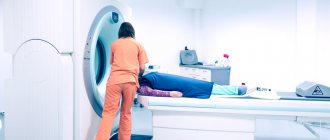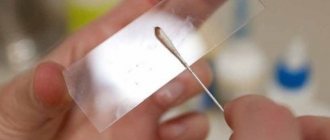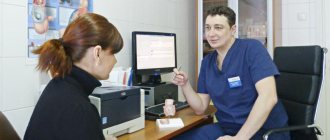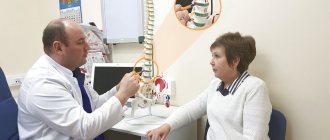Hemorrhoids are a fairly common disease among adult men and women, especially due to sedentary work. The problem is so delicate that many are embarrassed to go to the clinic and find out which doctor to make an appointment with. However, this is wrong behavior: if hemorrhoids are not treated, they become chronic. Exacerbation of the disease is caused by carrying heavy objects, pregnancy, and poor nutrition. If hemorrhoids are not treated, the problem will have to be corrected through surgery. Therefore, we recommend that at the initial manifestations of hemorrhoids you consult a specialist - a proctologist or coloproctologist.
What are hemorrhoids
Hemorrhoids are a pathological condition of the veins that supply the rectum. In particular, the diagnosis is made when varicose veins, thrombosis or other inflammatory processes are observed in the hemorrhoidal vein.
This condition is accompanied by the formation of lumps on the walls of the vein, which extend beyond the border of the anal ring and turn the everyday life of an ordinary person into flour. It’s not for nothing that great difficulties in life began to be called hemorrhoids - this is one of the most painful and delicate diseases.
Varicose veins of the vein that wrap around the intestine disrupt the blood circulation of the pelvic organs, make defecation difficult, create discomfort when walking, and cause severe pain when trying to sit down. The sooner the specialist’s attention is drawn to the problem, the easier and more painless the treatment will be.
Why is it important to see a doctor?
Hemorrhoids are a disease that causes discomfort and complicates a person’s life and work due to the following symptoms:
- pain during defecation;
- bleeding;
- itching, erosion, irritation, weeping skin around the anus;
- sensation as if there is something foreign in the anal canal.
If you do not begin to treat hemorrhoids, this leads to the appearance of cracks and tears, and inflammatory processes. Due to stagnation of blood, blood clots form, which impair tissue nutrition and lead to necrosis. This provokes severe pain and general intoxication. If the blood clot and the node are not removed in time, bleeding occurs. It is accompanied by a bacterial infection that spreads to the rectal tissue. This is fraught with sepsis and damage to neighboring organs.
Due to shyness in diagnosis and treatment, hemorrhoids quickly develop into an advanced state with complications. The longer you do not seek medical help, the more difficult it is to treat the disease, the risk of complications increases, and the need for urgent surgery. A timely visit to the doctor allows you to stabilize the condition and prevent hemorrhoids from entering the painful stage 4.
What causes hemorrhoids
If varicose veins of the lower extremities usually appear in a person after 50 years of age, then varicose veins of the rectum can occur at any age. Many factors contribute to the development of hemorrhoids. First of all, it is a sedentary lifestyle. Modern people spend more and more time at the computer, neglecting physical activity. Communication with friends is no longer accompanied by obligatory walks - any question can be discussed with the phone in hand, without leaving the couch.
Pregnant women are at risk for the formation of hemorrhoids. This is due to the fact that the intestines are subject to a certain pressure from the growing uterus, and the position of the fetus can even lead to pinching of the blood flow. Childbirth can be called a separate risk factor. A protracted period of expulsion of the fetus, which forces the woman to push for a long time. For this reason, bumps appear on the vein.
Constipation of any etiology is another risk factor. First of all, this concerns difficult bowel movements associated with poor diet. If there are no fruits in the food, and flour products predominate, this leads to the formation of hard lumps of feces, which injure the small surface of the intestine. Long-term efforts aimed at emptying the rectum often lead to the formation of varicose veins in the anal ring area.
Symptoms of hemorrhoids in women
The following symptoms are identified for hemorrhoids in women:
| Problems with bowel movements | The patient suffers from constipation. The feces harden, turn to stone and stagnate in the rectum, which causes a lot of unpleasant sensations. Diarrhea is also a common symptom of hemorrhoids. Regardless of the diet, the patient is worried about gastrointestinal disorders. |
| Flatulence | After eating, flatulence, bloating, and cramping pain in the intestines begin, which do not disappear even after taking painkillers. |
| Bleeding | Hemorrhage opens before and after defecation. In the early stages of hemorrhoids, blood leaves the body through droplets. At the third and fourth stages of hemorrhoids, a stream of heavy bleeding begins. |
| Prolapse of hemorrhoids | With hemorrhoids, hemorrhoidal nodes form in the anus. They begin to fall out before and after defecation. In the early stages of proctological disease, it is possible to straighten the nodes yourself without the help of a proctologist. At the fourth stage, the nodes fall out even with a strong cough, when moving, their size rapidly increases. |
| Lack of appetite | With hemorrhoids, women often notice a lack of appetite, nausea and vomiting after eating. |
| General weakness of the body | The patient feels severe weakness and lack of energy. |
| Itching and burning in the anus | Even in a lying position, a woman feels severe itching and burning, which intensifies when walking. |
Which doctor should a woman see for hemorrhoids? Not everyone can get an appointment with a highly qualified proctologist. Some medical institutions do not even have such a specialist. However, in order not to trigger the disease, a woman can seek help from other medical experts. Among them:
- gynecologist;
This specialist also conducts an initial examination of the anus and can determine the size of hemorrhoids. In addition, the gynecologist examines pregnant women who are at risk for hemorrhoids.
- therapist;
The therapist will not be able to conduct a full preventive examination of the patient, but will listen to complaints, symptoms and advise which medications can be used for hemorrhoids before preliminary treatment. This specialist also refers patients to see a specialist.
- surgeon;
Surgeons specialize in the treatment of diseases of the colon and rectum, conduct a full examination and prescribe effective treatment.
It is worth remembering that only a specialized specialist who specializes directly in proctology can completely cure the disease. We are talking about a proctologist and a coloproctologist.
Why self-medication is unacceptable
There are no folk methods or harmless procedures that, as part of self-medication, could effectively help with the occurrence of hemorrhoid symptoms. If the patient takes a responsible approach to the issue of his health and seeks help at the first manifestations of the problem, it is possible to stop the development of the disease using conservative methods. Drugs that prevent the formation of blood clots and increase the rheological properties of blood will relieve inflammation in the lower parts of the hemorrhoidal vein.
Dosage forms for topical use in the form of a cream or ointment will help relieve pain at the initial stage. Some are aimed at constricting blood vessels and relieving swelling, while others contain lidocaine, which relieves the sensitivity of the inflamed area. You should not buy such drugs on your own, as they are selected individually, depending on the clinical picture. And the presence of an anesthetic is a direct contraindication for some patients, since not everyone can tolerate lidocaine. The longer a patient waits to see a doctor, the higher the likelihood of disease progression. This means that a delayed visit to a specialist will result in a surgical operation.
Proctologists and coloproctologists
The exact name of medical specialties is approved by the List of the Ministry of Health. In government agencies, when applying for a job, they strictly ensure that the name of the specialty exactly complies with the law. Previously, doctors who treated hemorrhoids were called “proctologists.” Since 2014, they have been called “coloproctologists.” This is due to the fact that the field of study of pathology has been “expanded” a little - to the entire large intestine.
Depending on the place of work and the characteristics of the medical profile, coloproctologists can be:
- Therapists. In this case, the coloproctologist deals with the therapeutic (drug) treatment of the disease, as well as the treatment of Crohn's disease, colitis, and the elimination of infections and parasites that have settled in the intestines.
- Surgeons. Coloproctologists in this area practice minimally invasive methods of treating hemorrhoids, and also perform operations to remove tumors, hemorrhoidal cones, and polyps using special endoscopic devices.
A coloproctologist-therapist prescribes medications for the treatment of hemorrhoids, prescribes drugs for oral and local use, and prescribes a diet that must be followed. Doctors of this specialization usually work in clinics and provide outpatient appointments.
A coloproctologist-surgeon is a doctor who is consulted in cases where treatment with various home methods has not produced results, hemorrhoids have reached an advanced stage, complications have appeared (a crack in the intestinal wall), bleeding begins, hemorrhoids fall out or are pinched. All this requires surgical intervention.
Both types of coloproctologists have enough knowledge and experience to diagnose hemorrhoids, determine the stage of the disease, and choose an effective treatment method. At the appointment, the doctor finds out how long ago the signs of the disease appeared, what provoked it and led to its exacerbation. During the consultation, the specialist must examine the anus, palpate the lower rectum, perform anoscopy, and sigmoidoscopy. If necessary, additional studies such as irrigoscopy or colonoscopy are prescribed.
Based on research, complaints and tests, an individual treatment regimen for the patient is selected, taking into account age and the presence of other diseases. The therapeutic process and its effectiveness are monitored. For stages I-III of the disease, treatment is carried out using mini-surgery (sclerotherapy for external hemorrhoids, application of latex rings, ligation of blood vessels). Laser irradiation, cryotherapy, and thermal coagulation can also be used for treatment. After the procedures, the proctologist must prescribe therapy that will prevent the development of exacerbations and maintain a positive treatment result. To do this, the doctor explains to the patient the features of nutrition, hygiene, and regimen.
How is the examination carried out?
Proctologists treat hemorrhoids. If the district hospital does not have its own specialist, you should first contact a general practitioner, who, after listening to complaints, will give a referral to another medical institution or provide a card for treatment with a gynecologist.
The proctologist's appointment begins with listening to verbal complaints, which will be recorded in the patient's chart. After which the doctor will ask clarifying questions and begin the examination. It is important for him to see whether there are venous lumps outside the rectum, whether there are cracks in the skin, swelling and other signs of incipient hemorrhoids.
If the external examination does not give the doctor a complete picture, he can palpate the rectum, as well as prescribe conoloscopy and other examination methods.
Prescribing treatment does not mean that the patient, having received recommendations, will be able to overcome the disease. Conservative treatment methods require the same careful medical supervision as the recovery period after surgery. Therefore, it is important to visit a proctologist according to the schedule prescribed by him. This way, the doctor will be able to monitor the progress of treatment over time and, if necessary, make changes to the prescribed therapy.
Responsibilities of a coloproctologist surgeon
A coloproctologist-surgeon not only treats hemorrhoids, but also eliminates intestinal pathologies due to injuries and congenital diseases.
The doctor provides emergency or planned care if:
- hemorrhoids with complications;
- rectal fissures;
- intestinal polyps;
- paraproctitis;
- cysts and tumors.
The doctor’s task is to choose an effective treatment method, taking into account the diagnostic results and the general health of the patient. The choice of surgical intervention method is based on the relationship between the level of risk and predicting the development of the disease. The coloproctologist explains to the patient how to prepare for surgery, removes structures, eliminates cracks, and restores intestinal functionality. After the operation, a diet, dressings, local procedures, and medications are prescribed.
The responsibilities of a doctor in this specialization, in addition to seeing patients, include maintaining documentation, analyzing the effectiveness of his work, and improving his qualifications every 5 years. During retraining courses, the doctor gains knowledge about new therapeutic advances and drugs, and the capabilities of innovative diagnostic equipment.
Do I need to prepare for an examination?
First of all, before visiting a medical facility, you need to prepare the following documents:
- passport;
- policy;
- SNILS;
- registration if the patient applies at the place of stay, and not at the registration address.
Due to the fact that the doctor will examine the anus and rectum, many patients do not know how to treat the problem area. However, you don’t need to do anything special; it’s enough to carry out standard hygiene with soap and running water.
The doctor who treats hemorrhoids and how the examination is performed
After the patient has decided which doctor to go to for hemorrhoids, he should make an appointment at the clinic. As a rule, at an appointment with a proctologist, a diagnosis of the rectum and anus is carried out. Before the initial examination, the medical specialist cleanses the patient’s intestines with an enema. An alternative to an enema can be laxatives.
The proctologist is interested in the patient’s medical history and asks questions about the intensity, frequency and nature of the pain. The doctor then reviews the medical record to obtain information about comorbidities. The patient lies on the couch in a supine position, presses his legs to his stomach, bending them at the knees. The medical expert disinfects the affected area with antiseptic drugs and inserts an anoscope into the anus. Using this device, the proctologist determines the size of hemorrhoidal cones and diagnoses the condition of the mucous membrane. As practice shows, after an initial examination it is almost impossible to establish an in-person diagnosis.
After the consultation, the proctologist refers the patient to undergo tests and diagnostic tests. You need to take a general test of blood, stool, and urine to obtain information about the internal indicators of the body. If there is a risk of an infectious disease, the patient is tested for the presence of viral infections, including immunodeficiency virus, hepatitis B, C and others.
After passing the tests, the patient is sent for ultrasound diagnostics of the abdominal organs, undergoes radiography, and computed tomography. The proctologist determines the diagnosis and stage of the disease. After this, the patient is prescribed individual treatment. In the initial stages of the disease, suppositories, ointments and gels, and procedures are used. If we are talking about the third and fourth stages of hemorrhoids, then surgical intervention is performed.
Special Extras
Hemorrhoids today are no longer a problem exclusively for truckers. Not only drivers, but also successful office workers lead a sedentary lifestyle. This includes young people who prefer to communicate via the Internet instead of personal meetings and active pastime.
In addition, residents of modern cities are increasingly eating poorly. Affordable fast food dominates the daily diet, displacing plant-based and home-cooked foods. To prevent hemorrhoid symptoms, it is important to:
- To live an active lifestyle. Sedentary work should alternate with exercises.
- Make sure that every person’s diet includes fruits and vegetables, to avoid constipation.
- Do not abuse alcohol and get rid of nicotine addiction.
Stagnation of blood circulation in the rectum and the formation of blood clots directly depend on lifestyle, which means it is not difficult to protect yourself from one of the most unpleasant health problems.
Reasons for the development of hemorrhoids in women
There are many reasons that can affect the development of hemorrhoids in women, including:
- pregnancy and childbirth;
During pregnancy, the size of the fetus constantly increases. There is strong pressure on the internal organs. The functionality of the digestive tract organs is disrupted, and as a result, hemorrhoids and other proctological diseases often develop. During labor, this disease is observed in most cases. Pushing causes irritation of the rectal mucosa, the integrity of the soft tissues is disrupted, which leads to the formation of anal fissures.
- anal sex;
Constant anal sex negatively affects the condition of the anus. The risk of infection and the development of inflammatory processes increases. Itching and burning appears in the anus, hemorrhoids form. If neoplasms were noticed earlier, their size is rapidly growing.
- poor nutrition;
A disrupted diet affects the functioning of the gastrointestinal tract. The intestinal microflora is disrupted, soft tissues are injured, and blood vessels are damaged. The patient begins to have problems with the gastrointestinal tract, which cause hemorrhoids. Regular constipation, which causes anal fissures, is considered especially dangerous.
- alcoholism;
Excessive consumption of alcoholic beverages affects the functioning of the stomach and intestines. Intra-abdominal pressure increases, which affects the woman’s condition. Veins and vessels are affected, bleeding begins.
- excessive physical activity;
With increased physical activity, anal fissures form and the mucous membrane of the anus becomes inflamed. The patient feels pain on a constant basis. The pain syndrome intensifies especially when lifting weights and moving. The risk group includes teachers, conductors in public transport, gymnasts and athletes.
Hemorrhoids also appear in genetically predisposed people. Their body is weak from birth, so any disruption in the functionality of internal organs can affect the development of proctological disease.
What is the competence of a proctologist?
Having found out that you should go to a proctologist with hemorrhoids, you need to figure out what role this specialist plays in the treatment of the disease.
Stages of examination by a proctologist:
- Questioning the patient. The doctor gets acquainted with the patient’s medical history and verbally asks about the symptoms that worry the person.
- Finger examination on a proctology chair. Making a preliminary diagnosis.
- Purpose of instrumental diagnostic methods.
- Making a diagnosis (type, degree and characteristics of the course of hemorrhoids).
- Prescription of treatment.
The specialist gives the patient recommendations on how to prepare for instrumental diagnostics in order to obtain reliable research results.
What kind of doctor treats hemorrhoids in men?
Men develop hemorrhoids much less frequently than women. The risk group usually includes people who work physically. Among them are builders, security guards, and cleaners. Individuals who lead a sedentary lifestyle are also predisposed to the development of proctological diseases.
Which doctor should a man see if he has hemorrhoids? A narrow specialist in this field is a proctologist and coloproctologist. However, if you are unable to make an appointment with this particular medical specialist, make an appointment with a surgeon. The surgeon will conduct an initial examination and even refer you for surgery, if necessary.
You can seek help from a urologist, who will advise the patient, but will not be able to prescribe medication for the patient. A therapist can also provide a consultation.
Only a proctologist deals with the diagnosis and treatment of proctological diseases, can correctly determine the diagnosis and prescribe effective treatment. Treats diseases of the colon and anus.
Prevention
To prevent the development of problems with the rectum, the prevention of hemorrhoids in women is very important. It includes:
- eating healthy foods rich in fiber, vitamins and minerals;
- physical activity in the form of gymnastics, walking or cycling;
- absence of heavy loads on blood vessels - lifting heavy objects or staying in one position for a long time;
- maintaining perineal hygiene.
In order for the prevention of hemorrhoids in women to “work” in the right direction, it is recommended not to get carried away with diets, and also to normalize stool as much as possible. This will require drinking more fluids (at least 2 liters per day, including juices and teas) and eating regularly.
What to take with you to an appointment with a proctologist?
First of all, do not forget to take documents, without which you may not be able to get to the appointment. You will need:
- insurance policy;
- passport;
- SNILS pension certificate (plastic);
- War veteran's ID, if available.
If you are going to a public medical facility, then bring a clean diaper and shoe covers. In private clinics they are included in the cost of admission. If you go to the doctor with an acute attack of hemorrhoids, or call an ambulance, then you may be recommended to be hospitalized in an inpatient department. Take with you a change of clothes and shoes, personal hygiene items.
Who should be examined first?
The following categories of citizens should primarily contact a doctor treating hemorrhoids in men and women:
- Women during pregnancy and after childbirth;
- Women during menopause;
- People with excess body weight;
- People who work in sedentary jobs for a long time;
- Men aged 40 years.
Even if you do not belong to any of these categories, consult a specialist at the first manifestations of the disease. There is no need to self-medicate, because other diseases may have similar symptoms. Only a qualified specialist will be able to correctly diagnose, determine the stage of the disease, and prescribe the most effective therapy in a particular case.










